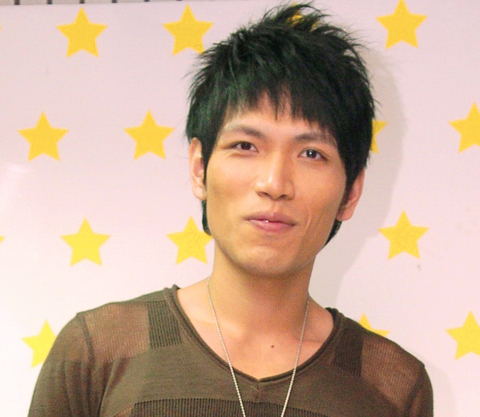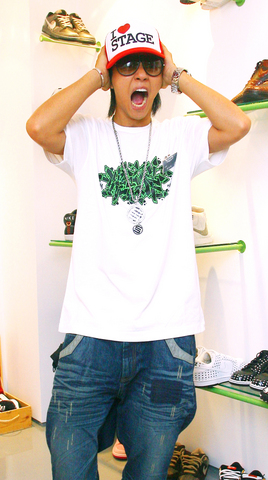It is amazing to see how the entertainment apparatus turns a nobody into a star and its efficiency to produce, consume and cash in on its creations is flabbergasting. Right now the machine is working its magic on Aska Yang (楊宗緯), its latest product. A local version of China's Li Yuchun (李宇春), Yang rocketed to stardom after participating in the singing contest One Million Star (超級星光大道), on national TV. Two months on, the college student-turned-household name keeps the nation enthralled with no more than a reasonably nice voice and a bent for getting teary eyed over defeated contenders.
Nicknamed cry baby for his tears and caveman for his rugged appearance, Yang has quickly become the gossip rag's new favorite as paparazzi digs out dirt saying the contestant once flunked out of college, subtracted five years from his real age and has developed a predilection for young, pretty assistants.
The show has been accused of deliberately eliminating Yang from the competition so that it can invite him back later in the game, adding a bit of suspense and drama to the show even as the star in the making ensures that gossip fodder is in ample supply.

PHOTO: TAIPEI TIMES
The Aska craze is predicted to reach a climax in a couple of months as Yang and the nine other finalists, now dubbed as the Million Star Gang (星光幫), are working on their first compilation album slated to hit the market in the summer. Whether or not the gang are successful products like Hello Kitty or Jolin Tsai (蔡依林), only time will tell.
In other tabloid news, A-mei (阿妹) is said to have developed a fancy for younger men as a widely circulated picture of her nestling up to Super Basketball League player He Shou-cheng (何守正) is interpreted as a sign of budding love by local media proficient in making gossip headlines out of nothing.
As the rumored romance comes suspiciously close to the release date of the star's new album next month, and one cannot but wonder whether the record company is getting a bit slack in resorting to a publicity gimmick that is so yesterday.

PHOTO: TAIPEI TIMES
Pop singer and entertainer Alan Luo (羅志祥) is apparently in the prime of his life. Not only does his romantic pursuit of the queen of cute Rainie Yang (楊丞琳) look promising, the business-savvy star has set up his own clothing brand and his first flagship store opened last weekend in Ximending (西門町).
Over 600 fans flooded into the store to pick up Luo's designs of limited edition clothing and plastic toys. And by the end of the day, the astute star took more than NT$1 million of bucks for what are in fact plain T-shirts and trinkets.
Meanwhile, Luo's past rumored girlfriend Jolin Tsai is spending the same amount of cash on the other side of the planet. Picking up pricey lessons from Kylie Monogue's dance instructor in London, the dance diva's studiousness has been faithfully documented by the record company, lauding the star as a studious young lady who can lead a ordinary life like other Taiwanese students do despite her fame and wealth.
Pop Stop just wants to point out one thing: expensive dance lessons, extravagant shopping and five-star hotel accommodation can hardly constitute a common experience shared by Taiwanese students in foreign countries.

The primaries for this year’s nine-in-one local elections in November began early in this election cycle, starting last autumn. The local press has been full of tales of intrigue, betrayal, infighting and drama going back to the summer of 2024. This is not widely covered in the English-language press, and the nine-in-one elections are not well understood. The nine-in-one elections refer to the nine levels of local governments that go to the ballot, from the neighborhood and village borough chief level on up to the city mayor and county commissioner level. The main focus is on the 22 special municipality

In the 2010s, the Communist Party of China (CCP) began cracking down on Christian churches. Media reports said at the time that various versions of Protestant Christianity were likely the fastest growing religions in the People’s Republic of China (PRC). The crackdown was part of a campaign that in turn was part of a larger movement to bring religion under party control. For the Protestant churches, “the government’s aim has been to force all churches into the state-controlled organization,” according to a 2023 article in Christianity Today. That piece was centered on Wang Yi (王怡), the fiery, charismatic pastor of the

Hsu Pu-liao (許不了) never lived to see the premiere of his most successful film, The Clown and the Swan (小丑與天鵝, 1985). The movie, which starred Hsu, the “Taiwanese Charlie Chaplin,” outgrossed Jackie Chan’s Heart of Dragon (龍的心), earning NT$9.2 million at the local box office. Forty years after its premiere, the film has become the Taiwan Film and Audiovisual Institute’s (TFAI) 100th restoration. “It is the only one of Hsu’s films whose original negative survived,” says director Kevin Chu (朱延平), one of Taiwan’s most commercially successful

The People’s Republic of China (PRC) invaded Vietnam in 1979, following a year of increasingly tense relations between the two states. Beijing viewed Vietnam’s close relations with Soviet Russia as a threat. One of the pretexts it used was the alleged mistreatment of the ethnic Chinese in Vietnam. Tension between the ethnic Chinese and governments in Vietnam had been ongoing for decades. The French used to play off the Vietnamese against the Chinese as a divide-and-rule strategy. The Saigon government in 1956 compelled all Vietnam-born Chinese to adopt Vietnamese citizenship. It also banned them from 11 trades they had previously